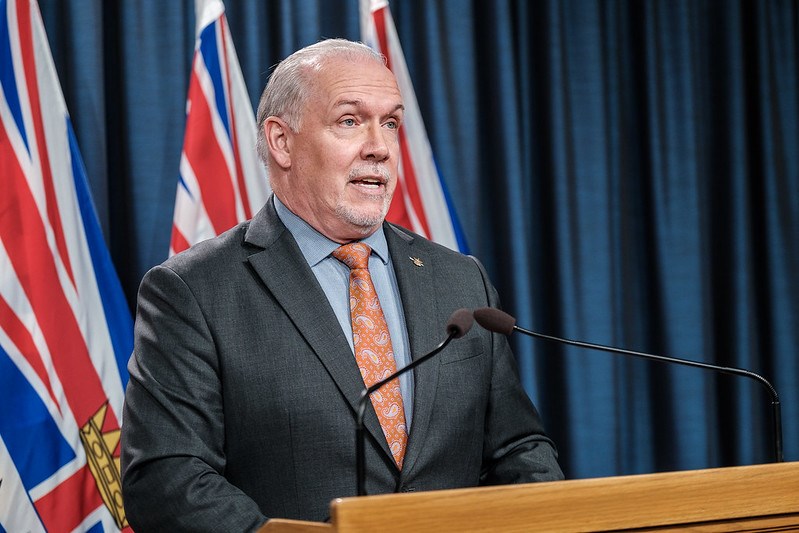Premier John Horgan extended the province’s state of emergency by two weeks on Wednesday, the longest period that emergency orders have been in place in B.C.’s history.
“People will remember back to 2017 the horrific fire season that year led to 10 weeks of emergency status in the province and we are now exceeding that with, I have to say, likely no end in sight,” said Horgan. The state of emergency for COVID-19 was announced on March 18.
“I’m excited about the future, but we also have to recognize that we don’t want to give up the ground that we have made collectively as individuals,” said Horgan, referring to the decreasing number of COVID-19 cases that have allowed for the gradual reopening of some sectors of the province.
The state of emergency was initially declared by Public Safety Minister and Solicitor General Mike Farnworth on March 18, a day after the provincial health officer declared a public health emergency. The state of emergency is in effect for 14 days at a time, at which point it must be extended or rescinded.
The current state of emergency is in effect until June 9, 2020.
A state of emergency allows the provincial health officer and minister of health to take swift action during the pandemic, Farnworth said, and to implement emergency measures. This includes securing critical supply chains to make sure people have access to essential goods and services.
During the past two weeks of the state of emergency, the government has released the initial set of WorkSafe B.C. guidelines to help businesses and organizations begin to reopen; authorized the hospitality sector to expand service areas, such as patios, to support physical distancing requirements; provided temporary COVID-19 pandemic pay for front-line workers as part of a cost-shared program with the federal government; announced the re-opening of schools on a part-time basis; and secured temporary accommodations and supports for people living in Topaz Park and on Pandora Avenue.
B.C. Health Minister Adrian Dix and Dr. Bonnie Henry, provincial health officer, announced nine new cases of COVID-19 on Wednesday, for a total of 2,550 cases in British Columbia; 2,144 have recovered.
There are 244 active cases of COVID-19 in the province, 37 are hospitalized, including seven in intensive care.
“Every health region in British Columbia has patients with COVID-19. Since the start of the pandemic, there have been 899 in the Vancouver Coastal Health region, 1,267 in the Fraser Health region, 127 in the Island Health region, 194 in the Interior Health region and 63 in the Northern Health region.
On Vancouver Island, 121 people have recovered, five have died and one remains in hospital.
A new death in the Fraser Health region announced Wednesday, brings the death toll to 162.
“COVID-19 has a two-week incubation period, which means any new cases that are a result of the easing of restrictions will start to appear over the coming week,” said Henry and Dix in a joint statement. “With this in mind, let’s continue to take advantage of parks and other activities closer to home, and look to increase social interactions only after fully considering the risks to you and your family.”
The easing of restrictions will include having the B.C. legislature resume its sittings on June 22, the premier said. “There is an expectation that members of the legislature will be here in Victoria in this building, conducting the democracy that we are so fond of and is so foundational to who we are.”
Some MLAs will attend in Victoria while others will call in from their home ridings, said Horgan, “but at the end of the day, debate will take place, votes will be cast and democracy will be well served.”
In a weekly availability following a cabinet meeting, the premier was asked about a report by Canada’s military on allegations of elder abuse in long-term care homes in Quebec and Ontario — reports of people left in filth for weeks, others left calling for help and improperly fed, cockroach infestations, and residents left with critical pressure sores.
Ontario Premier Doug Ford called the findings “appalling” and said reading the report on five homes in Ontario was the hardest thing he has done as premier.
Horgan said he was also “horrified to read the reports initially out of Quebec and most recently, of course, out of Ontario.” Those situations are not happening here, he said. “I can say with great certainty that the providers are giving the best care possible under extraordinarily difficult circumstances and the horror stories that we’re seeing out of Quebec and Ontario are not being duplicated here in British Columbia.”
Horgan also announced a new urgent and primary care centre in Surrey. Dix has been leading the charge since 2018 for health authorities to open such centres. Three are on the Island — in Langford, Nanaimo, and Victoria’s James Bay. A fourth is planned for the Wade Building at the corner of Johnson and Cook streets. An opening date has not been released.
The centres are intended to relieve some of the demand on hospital emergency rooms while linking more people with a primary care physician. The latest Surrey location is the 17th in B.C.
“I know in my community of Langford, the urgent primary care centre there has greatly relieved the pressure on the Victoria General Hospital and given the people in my community a sense of comfort that they can access care even though they don’t have a specific family doctor,” said Horgan.
With regard to the re-opening schools next week, the premier said he wasn’t fazed by suggestions only 50 per cent of students will return. “What will happen on Monday will happen on Monday … but I’m very comfortable that all of the players in the system are on the same page, that’s fantastic news for our system, fantastic news for our kids,” said Horgan.



